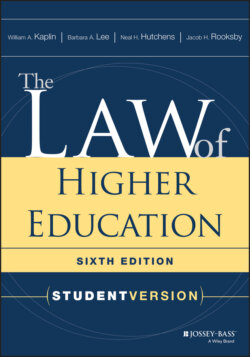Читать книгу The Law of Higher Education - William A. Kaplin - Страница 16
A Note on Nomenclature
ОглавлениеThe Student Version uses the terms “higher education” and “postsecondary education” to refer to education that follows a high school (or K–12) education. Usually, these terms are used interchangeably; but occasionally “postsecondary education” is used as the broader of the two terms, encompassing formal post–high school education programs whether or not they build on academic subjects studied in high school or are considered to be “advanced” studies of academic subjects. Similarly, this book uses the terms “higher education institution,” “postsecondary institution,” “college,” and “university” to refer to the institutions and programs that provide post–high school (or post–K–12) education. These terms are also usually used interchangeably; but occasionally “postsecondary institution” is used in the broader sense suggested above, and occasionally “college” is used to connote an academic unit within a university or an independent institution that emphasizes two-year or four-year undergraduate programs. The context generally makes clear when we intend a more specific meaning and are not using the above terms interchangeably.
The term “public institution” generally means an educational institution operated under the auspices of a state, county, or occasionally a city, government. The term “private institution” means a nongovernmental, nonprofit, or proprietary educational institution. The term “religious institution” encompasses a private educational institution that is operated by a church or other sectarian organization (a “sectarian institution”), or is otherwise formally affiliated with a church or sectarian organization (a “religiously affiliated institution”), as well as an institution that has no affiliation with an outside religious organization but nevertheless proclaims a religious mission and is guided by religious values.
